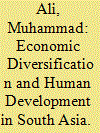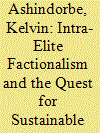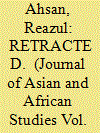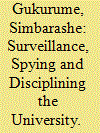|
|
|
Sort Order |
|
|
|
Items / Page
|
|
|
|
|
|
|
| Srl | Item |
| 1 |
ID:
167392


|
|
|
|
|
| Summary/Abstract |
The paper examines the effect of diversification on social welfare in South Asia using the macroeconomic data for the period 1996–2011, with export diversification as a proxy of economic diversification. In this paper, three types of diversification are assessed (i.e. related, unrelated, and overall variety). While unrelated variety and overall variety show increasing trend over the years, related variety seems to show a non-linear inverted U-shaped curve. Estimation results reveal that all three types of variety have a positive and significant relationship with human development in South Asia, which shows that diversification is beneficial for human development in South Asian countries. It is also found that the existing level of human capital significantly moderates the relationship between related variety and social welfare.
|
|
|
|
|
|
|
|
|
|
|
|
|
|
|
|
| 2 |
ID:
167393


|
|
|
|
|
| Summary/Abstract |
A significant number of studies indicate that economic prosperity promotes higher values such as democracy, equality and freedom of choice. Pakistan has witnessed a considerable increase in the size of the middle class contributing to the increased participation of women in the labour force. This increase may translate into higher values among working women across income classes. This article draws on structured interviews (n = 350) with working women in the metropolis Lahore to investigate the extent their socioeconomic status is linked with self-expressive values. By using the ordinal logit model, this paper observes that significant differences exist in women’s perceptions and values across income and education groups. This study confirms that women with higher income and education levels are more independent in their choices. They exercise more authority in their personal and public life. Results also confirm their considerable interest in the democratization process and diminishing involvement in religious practices relative to middle- and lower-income and education groups.
|
|
|
|
|
|
|
|
|
|
|
|
|
|
|
|
| 3 |
ID:
167396


|
|
|
|
|
| Summary/Abstract |
The People’s Democratic Party was the governing party for 16 years until it was defeated in the 2015 general elections. The dominance of the party over the Nigerian political landscape masked the deep internal schism that has bedevilled the party since its formation. This paper traced the origin of the protracted internal conflicts in the party to its formation process, accentuated by the prebendal character of the Nigerian state. A collection of political grandees assembled in the party without a well-articulated vision for governance other than take hold of political power and the resultant patronage accruable from occupying public office. Conflicts in the party manifest in several dimensions, namely: suspension or expulsion of party members, protracted litigation, formation of parallel party structure, defections to rival parties, verbal and physical assault of members. This pattern of conflicts weakened internal cohesion and distracted those elected from the task of actualizing their campaign promises. The methodology is qualitative, primary data sourced from party members is complemented with data from secondary sources. The paper concluded that the ultimate losers from the internal fights in the party are the citizens who suffered the effects in the form of unfulfilled electoral promises.
|
|
|
|
|
|
|
|
|
|
|
|
|
|
|
|
| 4 |
ID:
167389


|
|
|
|
|
| Summary/Abstract |
Uncertainties about the amount of resources needed to combat climate change, dwindling local resources, limited local autonomy and limited expertise constrain local governments (LGs) in their response to the effects of climate change. As a result, financing climate change remains a major nightmare for LG actors across diverse nested territorial containers. It certainly requires the embracing of a multifaceted approach – the use of system thinking where local governments’ resource husbandry is optimised to support external aid and central government transfer. A multifaceted approach brings onboard blended resources, diverse stakeholders, diverse resource mobilisation skills and schemes, and accountability measures. Also, given projected increases in future climate-induced public expenditure, albeit with uncertainties, reliance on a single resource mobilisation approach will be a recipe for inefficiency. This article argues that developmental aid and central government’s transfer remains inadequate to meet the increasing demand for adaptation cost at the local level in Ghana. In the face of the unequivocal impact of climate change risk, we contend that local resource husbandry must be optimised through different innovations to complement other major sources of financing. Our contention resonates with the school of thought that argues local level resources are more resilient to politicisation, are stable, and are predictable compared to international aid and central government transfer. Through qualitative in-depth interviews, empirical data has been drawn from local governments in Ghana to justify our claims.
|
|
|
|
|
|
|
|
|
|
|
|
|
|
|
|
| 5 |
ID:
167394


|
|
|
| 6 |
ID:
167391


|
|
|
|
|
| Summary/Abstract |
This study examines the preparation and implementation of the District Medium Term Development Plans in four sub-district structures in the East Gonja District to ascertain the veracity or otherwise of the planning process as established by laws and regulations. Using qualitative approaches of focus group discussions, interviews and documentary analysis the study reveals that the process of development planning was not participatory and was short-circuited. This therefore renders the District Medium Term Development Plans ineffective and less responsive to the needs of the people and/or the communities in the district. Also, the sub-district structures, though operational, were ineffective as a result of low revenue generated from the low-economic activities in the district coupled with the delay of the release of and the inadequacy of the District Assemblies Common Funds (DACF). No doubt, the challenge of resource constraint for effective planning is evident. There is therefore the need for a deliberate policy strategy towards establishing an insulated fund to support development planning at the district level.
|
|
|
|
|
|
|
|
|
|
|
|
|
|
|
|
| 7 |
ID:
167397


|
|
|
|
|
| Summary/Abstract |
This article examines the deployment of government spies and state security agents on a university campus in Zimbabwe and the implications this has on knowledge production at the university. The campus is presented as a socio-political space in which everyday political struggles are fought. I argue that surveillance is an intractable part of the rhythms of everyday life on campus, and a very specific form of ‘bio-power’, ‘biopolitics’ and violence meant to discipline students and lecturers, as well as the ways in which knowledge is produced and sedimented. Habitualisation of surveillance and fear of surveillance generate Foucauldian ‘panopticon’: producing ‘self-censorship’ on campus.
|
|
|
|
|
|
|
|
|
|
|
|
|
|
|
|
| 8 |
ID:
167395


|
|
|
|
|
| Summary/Abstract |
This paper is an attempt to investigate the historical trajectory of Ashrafia hegemony in Sindh, the province of Pakistan. I begin with the analysis of biopolitics of caste, class and religion organised around Hindu–Muslim binarism and unity as it unfolded during and after the partition of the Indian subcontinent. I particularly analyse the demographic shifts, the official categorisation of populations, and the communal and ethnonationalist claims that led to the specific kind of interpretation of religion, caste and class. Informed by the Ambedkarian subaltern perspective and based on the analysis of ethnographic data and vernacular literature, I explain that nationalist ideologies framed in the narratives of political Islam and Sufism tend to organise politics around Hindu–Muslim otherness, as in case of Pakistani nationalism, and Hindu–Muslim harmony, as in case of Sindhi nationalism. Based on that understanding, I argue that Ashrafia advantage, by and large, is the product of pre-existing historical hegemonic relations than any conscious strategy, and or directly imposed domination. Since both the Ashrafia narratives primarily imagine people through religious binaries, they lack the counter-hegemonic elements that could confront casteism that lies at the intersection of class and religion. None of the narratives, being performative projections of the ideal religious society, brought casteism in their focus while dealing with the structural inequalities, social hierarchies and the issues of political representation of the Dalit class. It resulted in the unwarranted legitimacy for Ashrafia hegemony, Jati Hindu domination and Dalit subordination. This re-hierarchised caste groups and continue to (re)distribute the caste capital by (re)producing Sayedism, Dalit exclusion and caste-class oligarchies.
|
|
|
|
|
|
|
|
|
|
|
|
|
|
|
|
| 9 |
ID:
167390


|
|
|
|
|
| Summary/Abstract |
Since Ghana’s independence in 1957, political corruption has been a significant problem impeding the development of the country. Based on primary and secondary data, this article argues that grand corruption such as Ghanaian political corruption mainly stems from a complex interplay of greed, opportunities grounded in monopoly power, and weak deterrent systems. Hence, uncontrolled political corruption is primarily a product of consistent political leadership failure to aggressively regulate greed, reasonably limit political power, and effectively strengthen the public-sector accountability structures. To help address political corruption, major stakeholders, particularly the political leadership, should critically analyze the legal regime, power structures, and deterrent mechanisms to remove opportunities for political corruption through effective checks and balances, surveillance, and sanctions. This paper makes theoretical and empirical contributions to understanding and tackling political corruption generally.
|
|
|
|
|
|
|
|
|
|
|
|
|
|
|
|
|
|
|
|
|